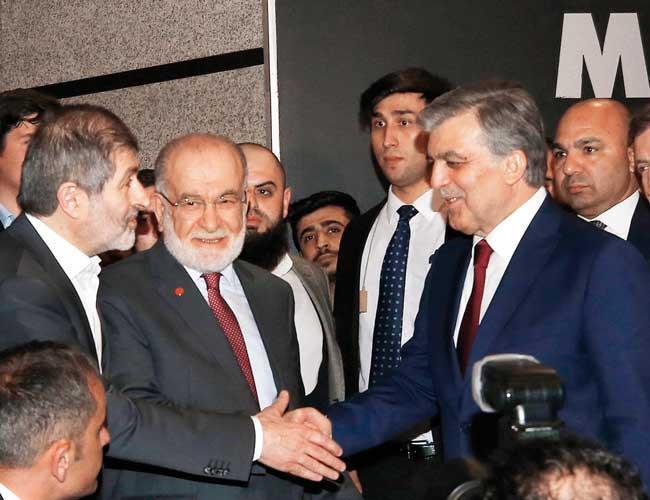Turkey’s parties continue intense talks over electoral alliances
ANKARA

Ahead of a tight electoral schedule for the upcoming snap elections to be held on June 24, the ruling Justice and Development Party (AKP) and opposition parties continued to engage in a whirlwind of talks on April 25 over possible electoral alliances.
The leaders of the main opposition Republican People’s Party (CHP), the Felicity Party (SP) and the İYİ (Good) Party have been keeping multiple dialogue channels open in a bid to form alliances and determine candidates to run against President Recep Tayyip Erdoğan in the June 24 elections.
The appearance of the leader of the traditional religious conservative party SP, Temel Karamollaoğlu, alongside former President Abdullah Gül at an award ceremony in tribute to former National Outlook (Milli Görüş) movement leader Necmettin Erbakan late on April 24 fueled speculation about Gül’s possible candidacy. The two also met on April 25.
The SP emerged out of the Milli Görüş, where prominent founding members of the ruling Justice and Development Party (AKP) had been actively involved before forming the ruling party. Being one of the founding leaders of the AKP, Gül’s last years in office marked important disagreements with Erdoğan. He has remained out of politics since he left office in 2014.
According to daily Hürriyet columnist Abdulkadir Selvi, the SP wants to present Gül as a joint candidate of the opposition against Erdoğan “because Gül has conditioned his candidacy as a joint-candidate.”
But nominating a joint candidate has not received positive response from opposition parties, with İYİ Party leader Meral Akşener reiterating her stance on April 25 that she will be the presidential candidate for her party, which is in favor of every party presenting its own candidates in the first round of the vote.
“I reiterate my presidential candidacy from the İYİ Party, through 100,000 signatures, as I had announced on April 1 when we had held our first extraordinary congress,” Akşener said following her meeting with CHP leader Kemal Kılıçdaroğlu on April 25.
The two leaders met at the CHP headquarters in Ankara for a 45-minute meeting during which Akşener said she again expressed her gratitude for the CHP’s support for the İYİ Party’s participation in the elections.
While avoiding answering questions concerning the candidacy, Kılıçdaroğlu underlined the CHP’s stance for “unity” among opposition parties for the elections.
Gül’s name had reportedly been suggested within the CHP but drew staunch opposition from many in the party’s based. CHP deputy Muharrem İnce also blasted the idea, suggesting that Gül is “an accomplice and brother of Erdoğan,” in a social media post on April 25. İnce said the former president “cannot and should not be CHP’s choice of option,” to run against Erdoğan.
CHP Deputy Group Chair Özgür Özel later joined the discussion over the CHP’s stance on Gül, saying “the CHP has never had Abdullah Gül’s name on the table. It doesn’t have it now and it won’t have it in the future.”
“Enough. We are fed up with all the speculations,” Özel added.
AKP-BBP meeting
Meanwhile, representatives of the ruling AKP and the Grand Union Party (BBP) also met in Ankara on April 25.
Speaking after the meeting, AKP spokesperson Mahir Ünal said BBP leader Mustafa Destici and President Recep Tayyip Erdoğan will meet later this week.
“A final decision will be made afterwards,” Ünal said regarding alliance principles with the BBP, adding that the AKP is not considering talks with the Free Cause Party (HÜDA-Par) or the Democrat Party (DP).
The BBP has endorsed Erdoğan’s candidacy and announced that it will support the “People’s Alliance” of the AKP and the Nationalist Movement Party (MHP).
According to the legislative package that allows pre-election alliances, parties can both enter an alliance with their own lists or present lawmaker candidates within an existing alliance.
Harmonization law passes in parliament
Meanwhile, in a late night session on April 24, parliament approved the legislative package on harmonizing existing electoral and political party laws, as the presidential elections will be the first election after a referendum in 2017 on constitutional amendments that seeks a shift to an executive presidential system.
The Supreme Board of Elections (YSK) is expected to announce the election schedule a day after the package is announced in the Official Gazette and parties are expected to submit their alliance protocols within a week of the announcement.
















